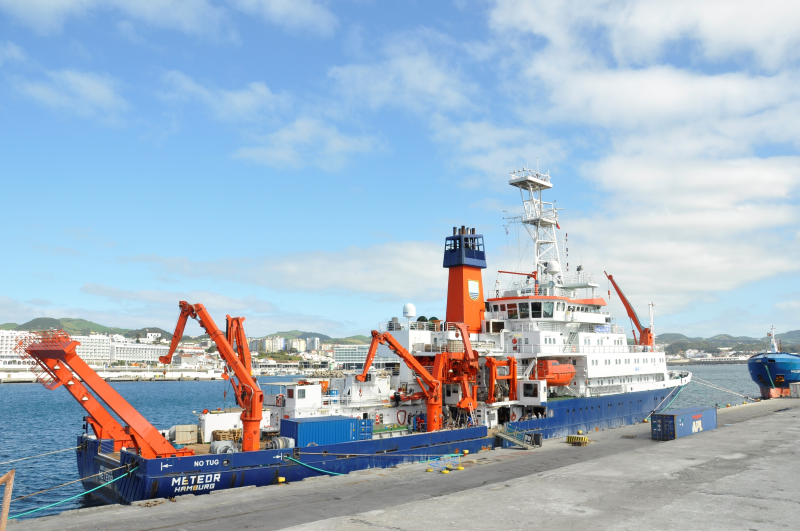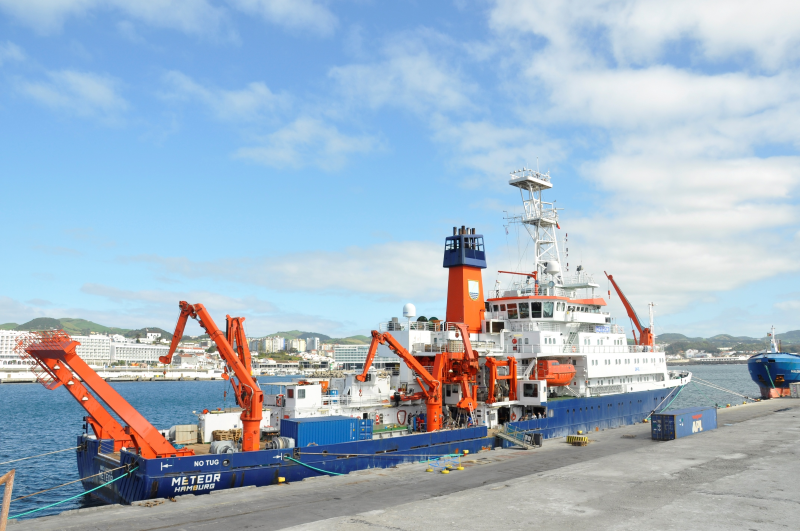Oceanographic Campaign M162
 2020-03-11 (IPMA)
2020-03-11 (IPMA)
Oceanographic Campaign M162
Exploring the flow of underground fluids and active dehydration along the oceanic plate boundary between Africa and Eurasia in the North Central Atlantic - (Gloria fault)
The oceanographic campaign M162 - GLORIA FLOW is taking place between March 5th and April 5th, on board the German oceanographic vessel Meteor, led by Dr. Christian Hensen of GEOMAR Helmholtz-Zentrum für Ozeanforschung.The study area is located in the Atlantic Ocean, along a segment of the Azores-Gibraltar plate fountain known as Gloria Fault.
The project is funded by the German agency German Science Foundation (DFG) and its main objective is to understand the geological processes that mediate the circulation of underground fluids in the deep ocean. Of particular importance is the understanding of the relationships between fluid circulation and seismicity, as well as understanding the geosphere-biosphere-hydrosphere interactions.
The eastern segment of the Azores-Gibraltar plate border, southwest of the Iberian Peninsula has been the subject of numerous studies of marine geology and geophysics, particularly with regard to tectonic processes that generate large earthquakes and tsunamis, such as that of 1755 and 1969.
The Gloria Fault corresponds to the westward extension of this plate boundary, a segment of about 900 km less known and whose anomalous deep structure was described by Portuguese and German scientists (L. Batista in this team and others). The Gloria Fault produced in 1941 the largest earthquake instrumentally measured in the North Atlantic, Europe and Africa originated, with magnitude 8.4 on the Richter scale. The GLORIA Fault owes its name to the first side scan sonar used to map large areas of the oceans (Geological LOng-Range Inclined Asdic sonar lateral).
A key segment of the Terceira rift will also be investigated, a tectonic structure to the NE of the Azores plateau, which constitutes one of the segments of the triple point that separates the American, Eurasian and African lithospheric plates. The deep structure of this area was recently the subject of a doctorate by the same Portuguese scientist from the University of Lisbon - IPMA (Luís Batista and others) in collaboration with the University of Hamburg. In this location, evidence of anomalous hydrothermal activity was found in the study phase.
During the course of the campaign, a set of techniques for indirect and direct sampling of the deep oceanic crust will be used, namely acoustic survey systems, measurement of thermal properties of the crust, capture of video images and sampling of sediments and fluids.
The acoustic systems are not potentially harmful to marine mammals, but there is still a group of observation of them during the experiments. Simultaneously, sediments are sampled for the study of the biological component, focused on the ecology of the surroundings, with the main objective of linking the studied environments with the communities of free-living marine nematodes associated with these deep-sea sediments.
The Portuguese team consists of scientists from IPMA, the University of Lisbon - Dom Luiz Institute and the University of Évora - Institute of Earth Sciences and the Center for Marine and Environmental Sciences (Pedro Terrinha, João Duarte, Helena Adão, Luis Batista, Katarzyna Sroczynska and Pedro Nogueira).
Imagens associadas


